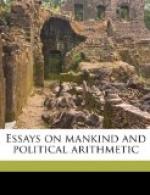2. The medium of births for the fifteen years being 984, whereof eight-fifths (being 1,576) is the standard of health for the said fifteen years; and the triple of the said 1,576 being 4,728, is the standard for each of the ternaries of the fifteen years within the said table.
3. That 2,952, the triple of 984 births, is for each ternary the standard of people’s increase and decrease from the year 1666 to 1680 inclusive, viz., the people increased in the second ternary, and decreased from the same in the third and fourth ternaries, but re-increased in the fifth ternary beyond any other.
4. That the last ternary was withal very healthful, the burials being but 4,624, viz., below 4,728, the standard.
5. That according to this proportion of increase, the housing of Dublin have probably increased also.
Observations upon the Table C.
1. First, from the Table C it appears, 1. That the housing of Dublin is such, as that there are not five hearths in each house one with another, but nearer five than four.
2. That in St. Warburgh’s parish are near six hearths to a house. In St. John’s five. In St. Michael’s above five. In St. Nicholas Within above six. In Christ Church above seven. In St. James’s and St. Katherine’s, and in St. Michan’s, not four. In St. Kevin’s about four.
3. That in St. James’s, St. Michan’s, St. Bride’s, St. Warburgh’s, St. Andrew’s, St. Michael’s, and St. Patrick’s, all the christenings were but 550, and the burials 1,055, viz., near double; and that in the rest of the parishes the christenings were five, and the burials seven, viz., as 457 to 634. Now whether the cause of this difference was negligence in accounts, or the greaterness of the families, &c., is worth inquiring.
4. It is hard to say in what order (as to greatness) these parishes ought to stand, some having most families, some most hearths, some most births, and others most burials. Some parishes exceeding the rest in two, others in three of the said four particulars, but none in all four. Wherefore this table ranketh them according to the plurality of the said four particulars wherein each excelleth the other.
5. The London observations reckon eight heads in each family, according to which estimation, there are 32,000 souls in the 4,000 families of Dublin, which is but half of what most men imagine, of which but about one sixth part are able to bear arms, besides the royal regiment.
6. Without the knowledge of the true number of people, as a principle, the whole scope and use of the keeping bills of births and burials is impaired; wherefore by laborious conjectures and calculations to deduce the number of people from the births and burials, may be ingenious, but very preposterous.
7. If the number of families in Dublin be about 4,000, then ten men in one week (at the charge of about 5 pounds surveying eight families in an hour) may directly, and without algebra, make an account of the whole people, expressing their several ages, sex, marriages, title, trade, religion, &c., and those who survey the hearths, or the constables or the parish clerks (may, if required) do the same ex officio, and without other charge, by the command of the chief governor, the diocesan, or the mayor.




